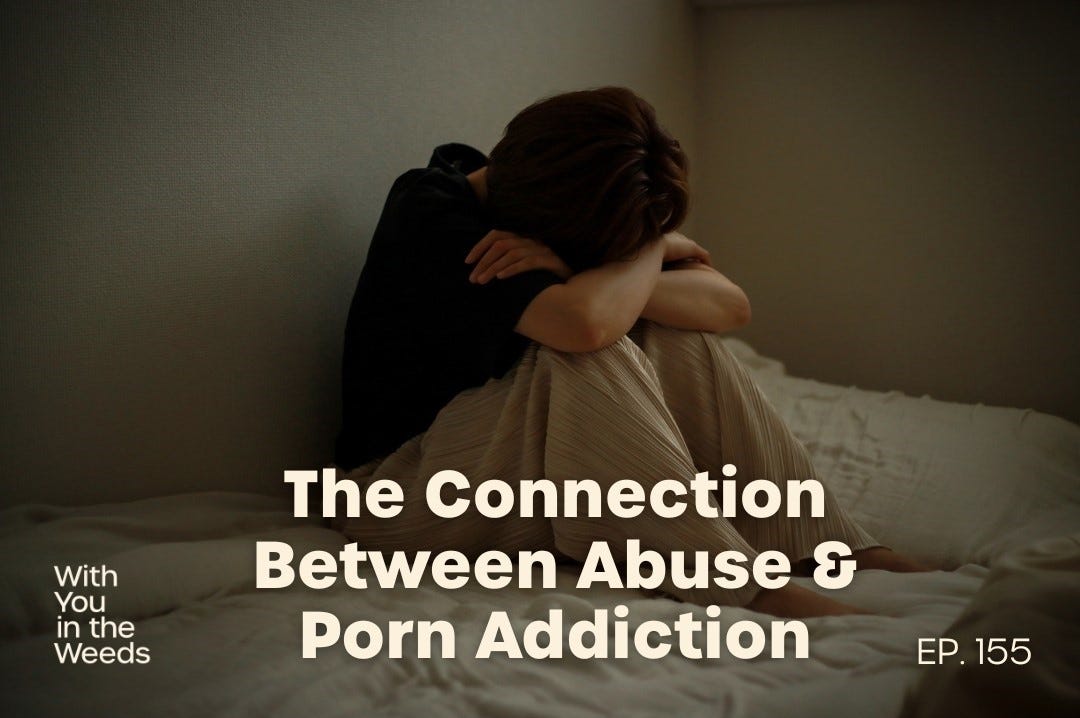The Connection Between Abuse and Porn Addiction
Reclaiming what was broken
What if your current struggle is about the wounds of being used, silenced, or shamed long ago?
In the previous episode of our ongoing series, Dealing with Your Addictions, we talked about how and why people find porn and become addicted. But we weren’t able to cover a very important factor: the connection between childhood sexual abuse and pornography addiction.
In this compassionate bonus episode of our porn mini-series, John and Austin discuss the ways that abuse can create a distorted view of your identity, which impacts your choices, feelings, and behavior around sex and sexuality.
If you’ve experienced physical and/or sexual abuse in your past—especially when you were young—or if you know someone who has, we encourage you to listen and pass this episode along to them as well.
How Abuse Shapes Your Sexual Story
When you can name and recognize what’s happened to you, and understand how your past connects to the present, that’s a great first step to breaking out of really damaging and destructive cycles like pornography addiction.
We’re going to keep it relatively simple. We’re going to explain the connection between sexual and physical abuse and pornography addiction. And unfortunately there IS a connection.
When someone is sexually abused, they are taken advantage of by someone else. Everything from sexually suggestive comments to unwanted touch to sexual abuse, especially by someone with power and influence in the child’s life, violates the child’s personal boundaries and their sexuality is fragmented and distorted.
This doesn’t mean that the survivor loses their dignity and value as a person. And it doesn’t mean they are to blame! In fact, they are not to blame in any way for what is done to them. It also doesn’t mean that an abuse survivor will never be able to have sex or enjoy the pleasures of sex in the future.
But it means that in fundamental ways, a survivor’s view of their sexuality is fragmented, and they develop beliefs about themselves that drastically affect their sexual identity.
4 Lies That Abuse Survivors Believe
1. That they are not worthy of having their boundaries respected. They can share and ask and even demand all they want, but they believe their voice won’t be heard. Why? Because when they were abused, their voice wasn’t heard! Their boundaries weren’t respected. It’s easy to believe that this is how things will always be.
2. That they are not in control of their lives, especially when it comes to sex and sexuality. If a survivor believes this, they will allow all sorts of harmful, controlling, and painful things to be done to them because they believe they can’t or shouldn’t stop it.
It’s very common for this felt lack of control to leave survivors frustrated, bitter, and resentful. An unconscious thought pattern can begin: “If only there was a place where I could get some control and agency and power in my life.” Enter pornography.
The survivor can now choose what they want to see, when they want to see it, and how they want to see it. They now have all the power that was lacking in their lives. This toxic pattern is known as ‘displacement’. In other words, the frustrations in one area of life are ‘displaced’ onto another.
3. That people can be treated like objects or things. These “things” are meant to be used, controlled, and consumed—including themselves. In other words, the experience of what happened to them when they were used is now projected onto other people. When they view pornography, they don’t see individuals, but body parts to be used without consent or respect.
4. That they deserved the abuse. They begin to wonder what they did, or didn’t do, to deserve the abuse from another. A powerful feeling of shame and self-loathing develops. The unconscious thought is, “I was the problem. The abuse was my fault.”
When you feel aroused, you also believe you are complicit. This sense of complicity evokes a great deal of shame, which may keep you stuck believing that you deserved the abuse (almost like a penance), and that you don’t deserve help or freedom.
Your Story Isn’t Over
If you’re an abuse survivor hearing this the first time, you might feel confused by all of this information. That’s okay. Healing from the effects of abuse is a long and complicated process. Growth and healing can happen, but it takes time. We recommend seeking professional help because of the deep and complicated nature of the wounds of abuse.
If you’re wondering how you can get help and freedom from your pornography addiction, then stay tuned, because our next episode is all about how to break free from porn. If this hits close to home, know this: your story isn’t over, and healing is possible.
Recommended Resources:
Listen or Read: How Did I Get Addicted to Porn? - The foundational first episode in our porn mini-series
Listen or Read: How Do I Break Free from Porn? - If you have almost given up on finding freedom, we’re offering practical steps for a porn-free future
Listen or Read: Flipping the Script on Your Childhood Trauma - Our own Jules Lundberg shares her story of healing from abuse and trauma
On The Threshold of Hope: Opening the Door to Healing for Survivors of Sexual Abuse by Diane Langberg - In this sensitive and insightful book, Dr. Langberg walks with survivors on the road to healing through Christ’s love and power.


